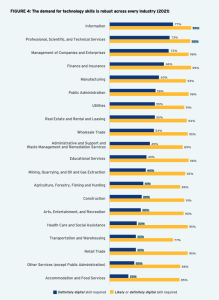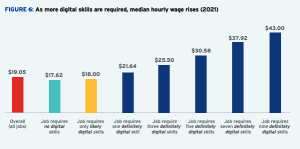Robots, AI, and ChatGPT are becoming more prevalent in the workplace, but the constant hype that they will be replacing workers any time soon remains largely that — hype. The reality is that organizations continue to demand employees with digital skills to complement evolving technology. But as new research points out, a digital skills divide continues to make it difficult for employers and job seekers alike.
According to new findings by the National Skills Coalition and the Federal Reserve Bank of Atlanta, 92% job posts across all industries and company sizes (totaling some 43 million posts in 2021) require some level of technology proficiency. For instance, in 2019, 15% of job posts for oilfield/rig workers required a “definitely digital” skill. By 2021, the number jumped to 38%.
In other words, it’s not just traditional knowledge work that’s being impacted.

At the same time, nearly one-third of workers, particularly people of color, lack foundational digital skills. It’s a figure that should be considered against the fact that among the industries with the highest demand for workers with digital skills, several have a disproportionate concentration of white workers. Namely, the information industry and the finance/insurance industry, which are 65% and 67% white, respectively.
“The relatively lower concentration of workers of color in these industries suggests that they are missing out on opportunities to earn higher wages, which can worsen existing racial inequities in income and wealth,” the paper points out.
The study also makes the point that much of the conversation about digital know-how typically focuses on access to broadband and various devices. That’s important, of course, but access is not the same as actually building necessary capabilities.
This is where the $2.75 billion Digital Equality Act comes in. The bipartisan law seeks to “establish three grant programs that promote digital equity and inclusion. They aim to ensure that all people and communities have the skills, technology, and capacity needed to reap the full benefits of our digital economy.aimed to help people build digital skills.”
The study suggests that by helping people build their digital skills, workers who “qualify for jobs that require even one digital skill can earn an average of 23% more than in a job requiring no digital skills.” What’s more, people who switch from a position demanding no digital skills to one requiring at least three can expect an average pay increase of 45%.

Additionally, the findings show that “turnover costs (estimated at $25,000 when a worker quits within the first year to over $78,000 after five years) can be averted or delayed by ensuring that workers have upskilling opportunities.”
